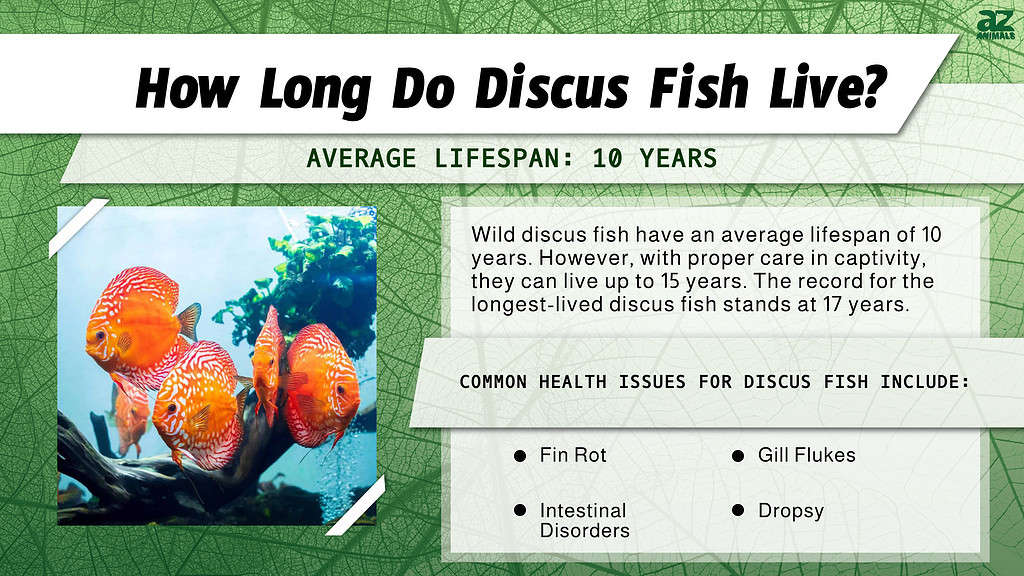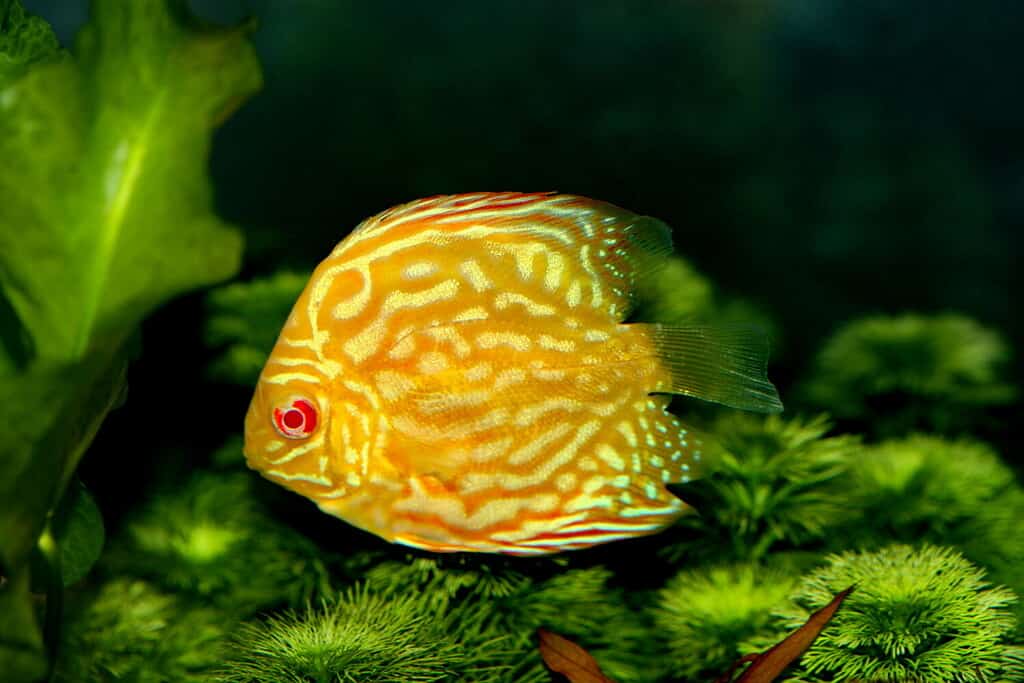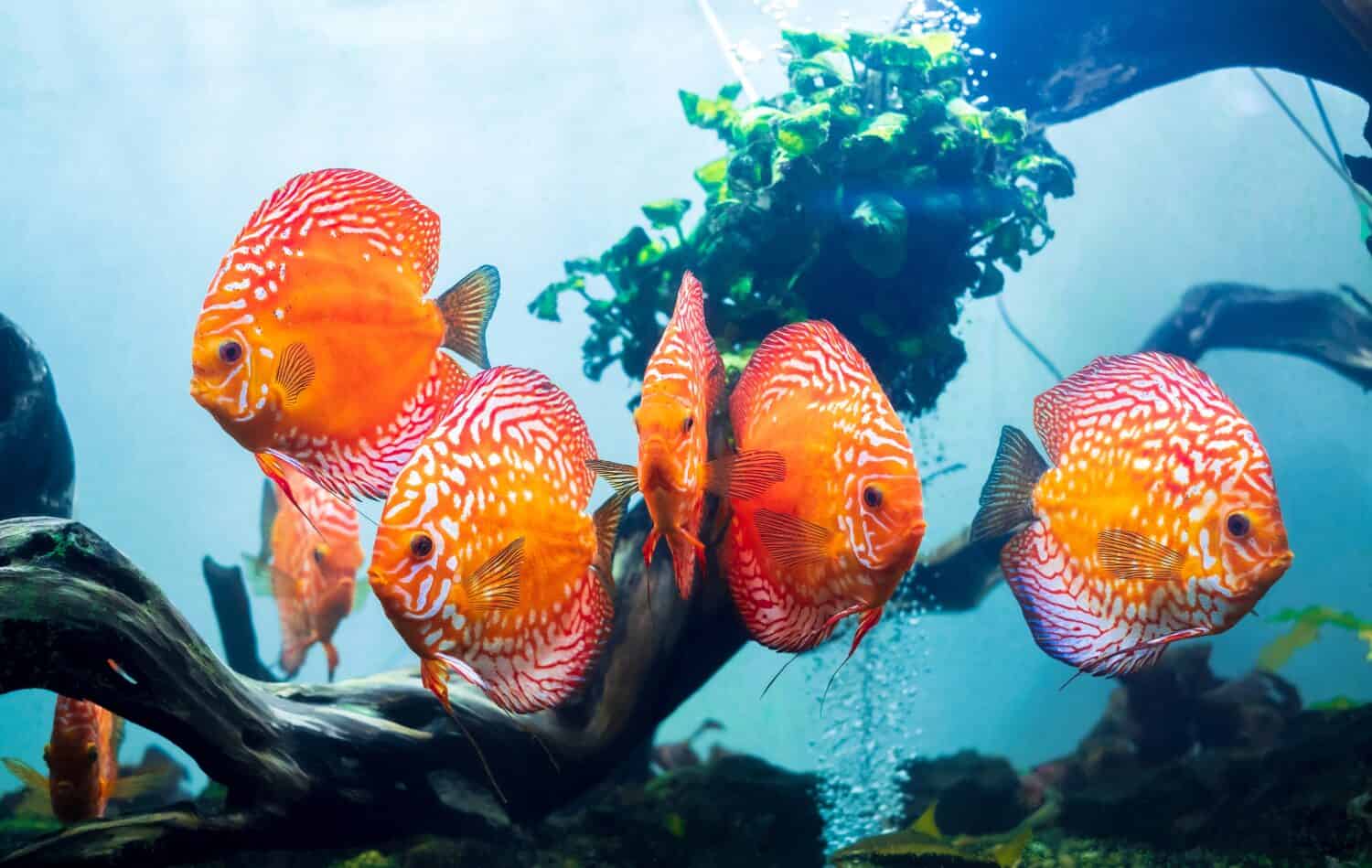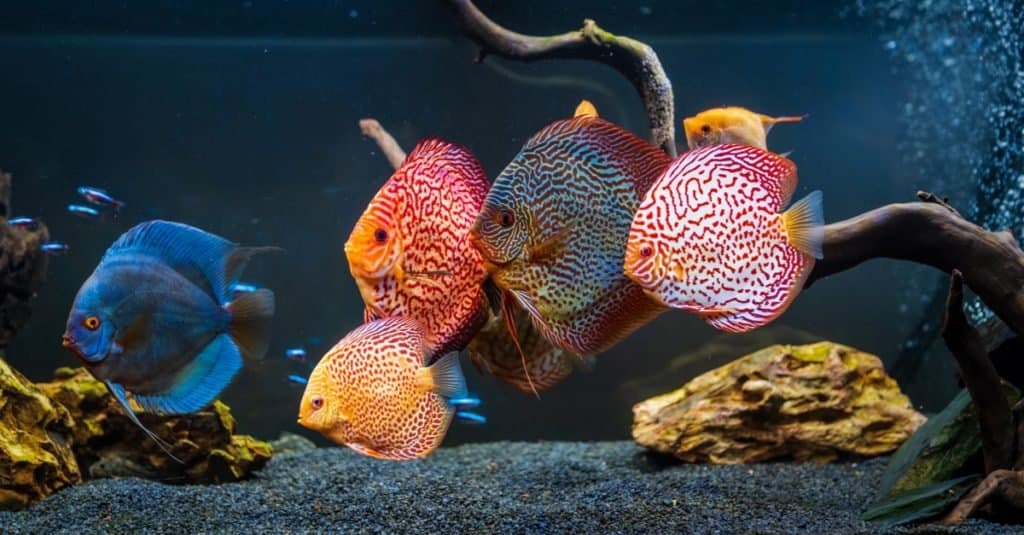Introduction

Discus fish are extremely popular fish in freshwater aquariums. Their interesting shape and bright colors make them fun to look at and collect. While native to sections of the Amazon River Basin, discus fish are much more exotic in captivity. This is because they have been domesticated and selectively bred over time in order to generate a more striking appearance. In Native American cultures, the discus fish is often associated with fertility and abundance. The fish is associated with the rain god, making it a powerful spiritual guardian. Discus fish have many different symbolic meanings to various cultures, showing their prominence and captivating. Keep reading to learn all about the lifespan of a discus fish and more!
Overview: Discus Fish

Discus fish colors can change and intensify.
©Arunee Rodloy/Shutterstock.com
Native to the Amazon River Basin of South America, discus fish are fascinating creatures. They get their name from their flat, round shape, similar to a discus used for track and field. Discus fish are called the “King of the Aquarium Fish” due to their popularity and desirable features. One interesting fact about discus fish has to do with their colors. While the most common colors of discus fish are green, blue, and brown, these can change and intensify. When discus fish experience intense emotions such as fear or anxiety, their coloring will become brighter and more vibrant.
Discus Fish Behavior
These fish measure between five and six inches in length in the wild, but can reach up to nine inches in length in captivity. While they are fairly long, their flat bodies make discus fish weigh less than half a pound at most. Discus fish are mainly carnivorous, feeding off of small worms, insects, and other creatures in their natural habitat. However, they sometimes consume plant matter in order to replenish vitamin sources in their bodies. When in captivity, these fish typically can survive off of commercial fish food.
One interesting aspect of the discus fish is their mating habits. Male and female discus fish stay together while their young, or fry, are growing and developing. Both sexes secrete a mucus that the fry consume, providing nourishment and ensuring vitality. Discus fish couples are not entirely monogamous, however, they stay together for a longer period of time than many other fish species.
The Average Discus Fish Lifespan

The longest-living discus fish was reportedly 17 years old.
©ISEN STOCKER/Shutterstock.com
The average discus fish lifespan in the wild is usually around 10 years. However, these fish can live up to 15 years in captivity with the proper care.
While these fish are extremely popular, they have a much shorter lifespan than many other species of aquarium fish. The longest-living discus fish was reportedly 17 years old, just two years older than the maximum lifespan for the species. Usually, discus fish begin showing signs of age around just five years old. Because of their small size and inability to defend themselves in the wild, these fish often perish at the doing of other larger creatures. Some of the biggest predators for discus fish include birds, turtles, and larger species of fish.
How to Extend the Life of Your Pet Discus Fish

Discus fish live best in groups of six or more
©Przemek Iciak/Shutterstock.com
When discus fish are not subject to the dangers of the Amazon River Basin, it is much easier to maximize their lifespan. With the proper care, these fish will live long lives with little complications. Here are the best ways to ensure that your pet discus fish will continue to dazzle your aquarium for years to come.
- Tank size is important. While discus fish are not very large, they still require a good amount of space to swim around in. In order to provide enough space for each discus fish you adopt, it is imperative that your tank is large enough to accommodate the fish. Generally, 10 gallons of water per discus fish is a satisfactory amount to keep the fish happy and healthy.
- In addition to tank size, the properties of the water that fills it have specific requirements. Discus fish are freshwater fish native to the Amazon River Basin, which has a slightly warmer average temperature than many other places around the globe. The perfect temperature for a discus fish habitat ranges from 82 to 88 degrees Fahrenheit. On top of temperature, you should also pay attention to the pH levels of the water. Discus fish require fairly neutral waters, with a pH of between five and six.
- Discus fish also need to receive proper nutrition. While they are mainly carnivorous in the wild, these fish can eat both animal and plant matter. In fact, it is important to feed them plant matter such as algae pellets in order to give them the proper vitamins. High-quality fish flakes and pellets are ideal for the discus fish, as long as they have a good source of protein. In addition to the quality of the food, you need to pay attention to the quality. Over-feeding these fish will leave food in the tank, polluting the water and making the overall quality of living worse.
- Finally, these fish need to live together in groups. Because discus fish swim in schools in the wild, they are naturally very social creatures. In order to maximize their well-being in captivity, these fish should live together. It is recommended that aquariums with discus fish have a minimum of six of the creatures living together at all times.
The photo featured at the top of this post is © PAUL ATKINSON/Shutterstock.com
Thank you for reading! Have some feedback for us? Contact the AZ Animals editorial team.







